Performance Anxiety and Erectile Dysfunction: Breaking the Vicious Cycle
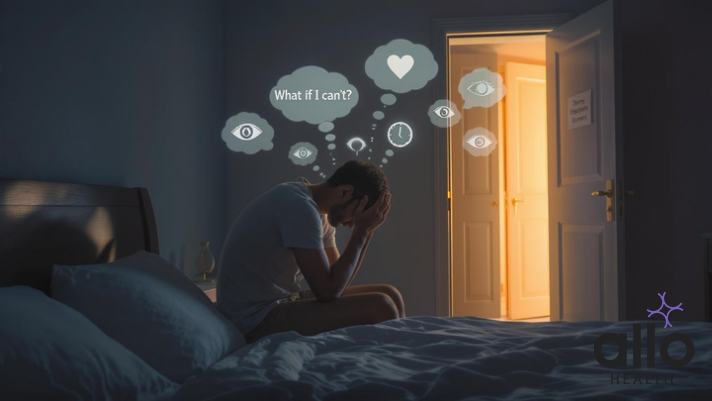
Performance anxiety erectile dysfunction happens when worry about sexual performance triggers your body's stress response, releasing hormones that restrict blood flow to the penis and make erections difficult or impossible. You can identify if your ED is anxiety-related rather than physical by looking for key signs: you can achieve erections during masturbation but struggle during partnered sex, your performance varies inconsistently based on mood or situation, and medical tests have ruled out physical causes. The good news is this creates a treatable cycle- anxiety causes ED, which increases anxiety, which worsens ED- but it responds exceptionally well to psychological therapies like CBT, mindfulness, and communication techniques. Most men see significant improvement within 4-8 weeks when they address the root psychological cause rather than just treating the physical symptoms, making this one of the most successfully treatable forms of erectile dysfunction.
If you’re experiencing performance anxiety-erectile dysfunction, you’re not alone, and you’re not broken. This common issue affects up to 1 in 4 men and happens when anxiety about sexual performance makes it hard to get or keep an erection, even if you’re otherwise healthy. The good news? This type of ED is highly treatable.
In this article, we’ll explain what causes performance anxiety ED, how to tell if it’s affecting you, and most importantly, how to overcome it with proven strategies and professional guidance.
What Is Performance Anxiety Erectile Dysfunction?
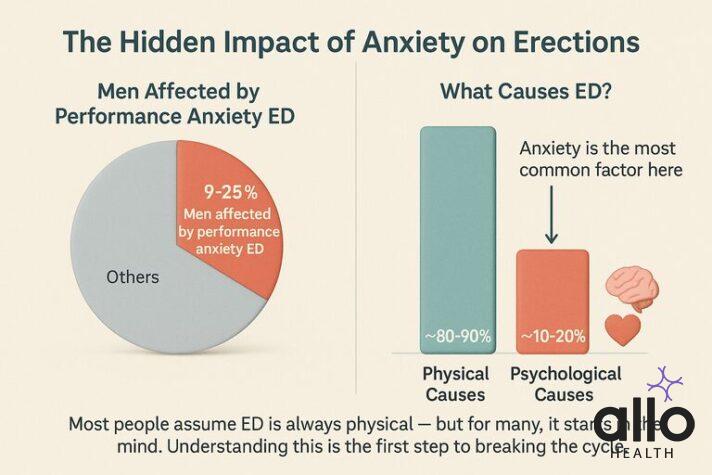
In simple terms, performance anxiety erectile dysfunction is the inability to get or maintain an erection due to anxiety about your sexual performance. It’s the worry about if and how you’ll be able to perform in bed, and this anxiety itself ends up interfering with your ability to get an erection.
This form of sexual performance anxiety affects approximately 9–25% of men and can occur before or during sexual activity[1].
While ED can have both physical and psychological causes, studies show that psychological factors contribute to around 10–20% of all ED cases[2], with anxiety being one of the most common psychological triggers.
When you’re anxious about whether you’ll be able to perform, satisfy your partner, or meet expectations, especially when combined with everyday stress, it can significantly affect not just your erection, but the entire sexual experience.
Allo Health Insight
Out of 1,72,620 patients at Allo Health, 75,062 reported erectile dysfunction, with 1,166 cases linked to anxiety-related causes. This highlights the real and measurable impact of performance anxiety on sexual health.
Why Does Sexual Performance Anxiety Lead to Erectile Dysfunction?
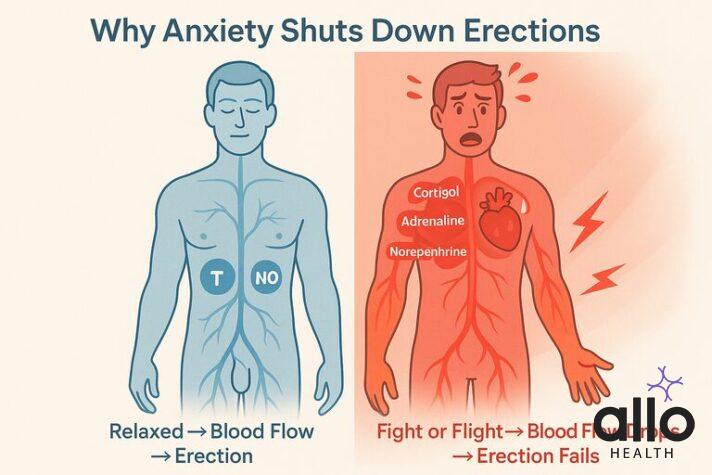
Now, why can’t one get an erection when nervous? When experiencing anxiety or stress, the body releases three hormones: Cortisol, Adrenaline, and Norepinephrine. These are the “fight or flight” hormones. As soon as these get into action, a number of changes happen in the body that directly affect erections. Let’s see what they are:
- The blood vessels start constricting, which reduces the blood flow, including to the penis.
- During a stressful environment, blood flow is diverted to major muscles rather than to the sex organs.
- Heart rate and blood pressure rise, which disrupts normal sex drive and sexual performance.
- High cortisol levels(stress hormone) interfere with the parasympathetic nervous system (bunch of nerves and their network) needed for erection.
- High cortisol levels are also known to lower the levels of sex hormones.
The Vicious Cycle of Anxiety and ED
The relationship between performance anxiety and erectile dysfunction often creates a vicious cycle that becomes increasingly difficult to break. What is this cycle? Let’s find out:
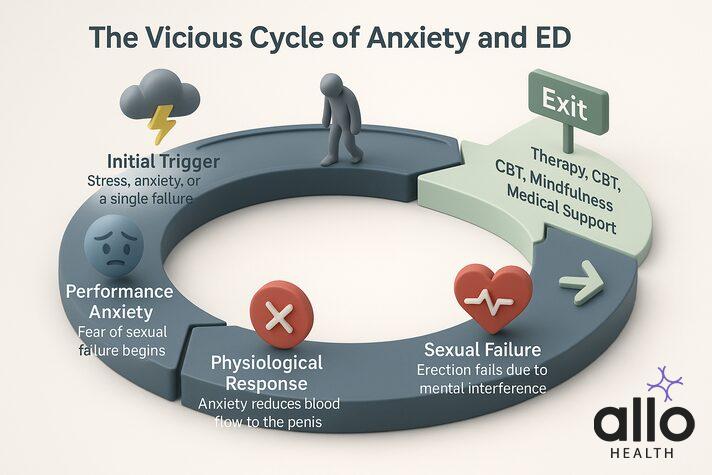
1. Initial trigger: Stress, anxiety, or a single episode of erectile difficulty
2. Performance anxiety develops: Fear of future sexual failure emerges
3. Physiological response: Anxiety activates the sympathetic nervous system, reducing blood flow to the penis
4. Sexual failure occurs: The feared outcome materializes due to anxiety
5. Increased anxiety: Each failure reinforces the fear, making future episodes more likely
Common Triggers of Performance Anxiety
What causes or triggers these nervous erectile dysfunctions? Let’s try to understand this.
| Primary Contributors | Secondary Factors |
|---|---|
|
Body image concerns and worries about physical appearance |
Depression, chronic stress, and low mood |
|
Fear of inadequacy or inability to satisfy a partner |
Low self-esteem and feelings of inadequacy, social anxiety |
|
Previous negative sexual experiences or trauma |
Unrealistic expectations about sexual performance |
|
Relationship problems and communication issues |
Fear of premature ejaculation or delayed orgasm |
|
General stress from work, finances, or life changes |
Self-critical thoughts |
Signs Your Erectile Dysfunction May Be Caused by Anxiety
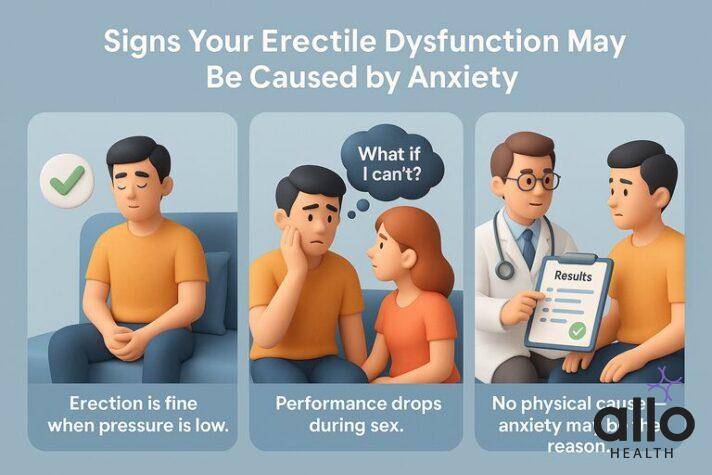
If you’re wondering whether your ED is linked to anxiety rather than a physical issue, here are a few clues:
- You can get erections during masturbation but struggle during sex. This usually means your body is capable, but the mental pressure of sexual performance interferes with arousal in the moment.
- Your performance is inconsistent. Some days are better than others, or it varies depending on your partner, mood, or setting – this kind of fluctuation often points to psychological factors.
- A doctor has ruled out physical causes. If medical tests come back normal, it’s a strong sign that stress, overthinking, or fear might be the root cause.
Performance anxiety ED is one of the most treatable forms of erectile dysfunction. With the right approach, whether that’s therapy, relaxation techniques, or open communication, most men see real improvement.
How to Overcome Performance Anxiety -Erectile Dysfunction
Here’s some encouraging news: performance anxiety- erectile dysfunction respond really well to treatment. In fact, many men see significant improvements within just a few months. Let’s walk through your options, starting with what research shows works best.
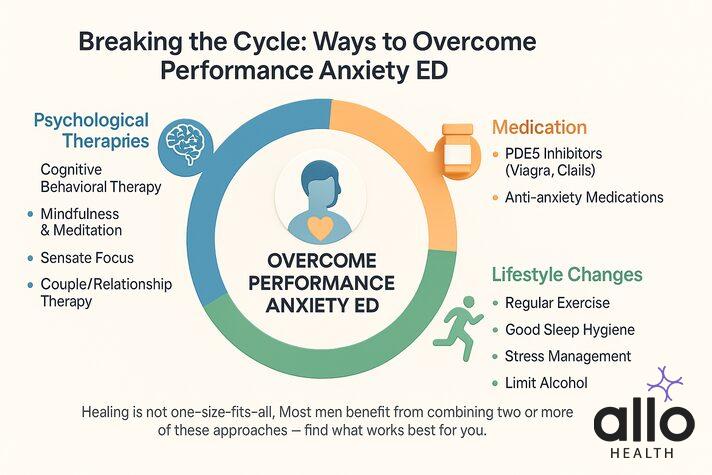
1. Psychological Therapies(Sex Therapy)
Cognitive Behavioral Therapy (CBT)
Think of CBT as rewiring your brain’s approach to sex. Most men see improvement within 8-12 sessions[3]. It’s considered the most effective treatment for psychological ED, and here’s what happens:
- You’ll learn to catch and challenge those destructive thoughts like “What if I can’t perform again?”
- Your therapist will teach you practical relaxation techniques you can use in the moment
- Together, you’ll unpack unrealistic beliefs about societal pressure and toxic masculinity that might be adding pressure
- You’ll develop better communication skills with your partner
Mindfulness and Meditation
Mindfulness helps you get out of your head and back into your body, which is exactly what you need during intimate moments. Studies[4] show that even short 4-week mindfulness programs can lead to significant improvements. Here’s how it helps:
- Reduces that mental chatter that kills the mood
- Teaches you to focus on physical sensations rather than anxious thoughts
- Improves overall stress management
- Enhances sexual satisfaction and sexual performance beyond just erection quality
Sensate Focus
It is a structured touching exercise that helps couples. By removing the “goal” of erection and orgasm, you can relax and actually enjoy the experience[5]. Many couples find it brings them closer together, even beyond addressing the ED. Here’s how it works:
- You and your partner engage in structured touching exercises that specifically avoid genital contact at first
- The goal is pleasure and connection, not erection or orgasm
- You gradually progress through different levels of intimacy
- It systematically reduces performance anxiety while rebuilding confidence
Couple and Relationship Therapy
Including your partner in treatment isn’t just helpful – it often makes the difference between success and continued struggle. Research shows significantly better outcomes when partners are involved. What you’ll work on:
- Learning to talk openly about sex without embarrassment or blame
- Addressing any relationship issues(relationship counseling) that might be contributing to anxiety
- Creating a supportive environment where both partners feel comfortable
- Developing strategies you can use together at home
Immediate Techniques for Anxious Moments
- Box breathing: Inhale for 4 counts, hold for 4, exhale for 4, hold for 4. Repeat.
- Progressive muscle relaxation: Tense and release muscle groups from your toes to your head
- Mindful touch: Focus entirely on physical sensations rather than mental chatter
- Open communication: Tell your partner what you’re feeling – anxiety loses power when it’s shared
2. Medication
Let’s be clear: pills alone won’t fix performance anxiety. But sometimes they can provide the confidence boost you need to break the cycle while you work on the underlying issues.
PDE5 Inhibitors (Viagra, Cialis, etc.)
- They make it easier to achieve and maintain an erection, which can reduce worry about performance
- Success with medication often provides the psychological boost needed to address underlying anxiety
- They work best when combined with therapy, not used as a standalone solution
- These medications treat the physical symptom of ED but don’t address the root cause (anxiety). Many men find them most helpful in the early stages of treatment.
Anxiety Medications
Traditional anti-anxiety medications (like SSRIs) often make sexual problems worse, not better. But, some options like buspirone or bupropion may have fewer sexual side effects. Talk to your doctor before starting any medications.
3. Lifestyle Changes
- Regular exercise: 30 minutes of moderate activity most days improves both circulation and mood
- Sleep hygiene: Poor sleep directly impacts sexual function and increases anxiety
- Stress management: Whether it’s meditation, yoga, or just regular walks, find what works for you
- Limit alcohol: While a drink might seem to help with nerves, alcohol actually impairs sexual function
Your Blueprint For Healing From Nervous Erection
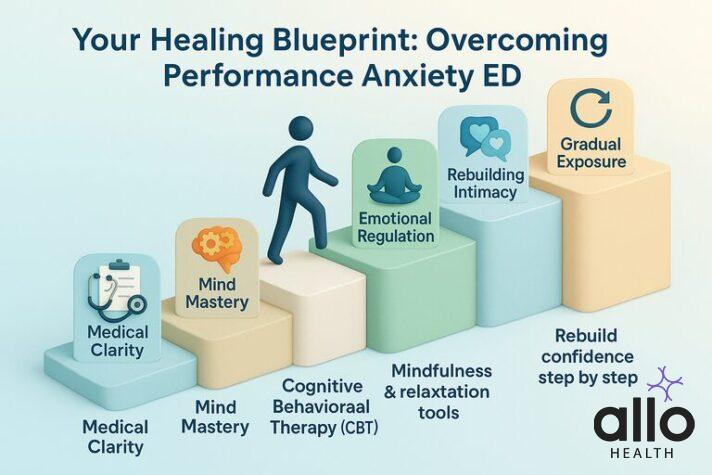
| Step | Step Name | What It Means |
|---|---|---|
|
1 |
Medical Clarity |
Start by ruling out physical causes of ED with a doctor. This gives you peace of mind and helps target the root of the issue more confidently. |
|
2 |
Mind Mastery |
Work with a therapist to recognize and reframe unhelpful thoughts, fears, or catastrophizing related to sexual performance. |
|
3 |
Emotional Regulation |
Use mindfulness, deep breathing, and body awareness to stay present during intimacy and reduce anxiety responses. |
|
4 |
Rebuilding Intimacy
|
Engage in open communication and try “sensate focus” exercises to reconnect emotionally and physically with your partner without pressure to perform. |
|
5 |
Gradual Exposure
|
Slowly reintroduce physical intimacy in a safe, supportive setting. Build positive experiences over time to retrain your brain and body. |
When to Seek Professional Help
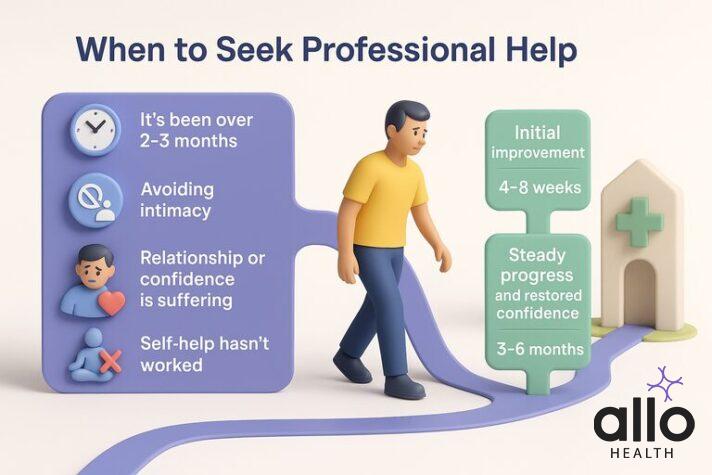
You don’t have to suffer in silence or wait for things to get worse. Consider reaching out to a professional if:
- Performance anxiety has persisted for more than 2-3 months
- You’re avoiding sexual activity altogether
- The issue is affecting your relationship or self-esteem
- Self-help strategies aren’t providing relief
Timeline for improvement: With the right treatment approach, most men see some improvement within 4-8 weeks, with continued progress over 3-6 months[6].
KeyTakeaways
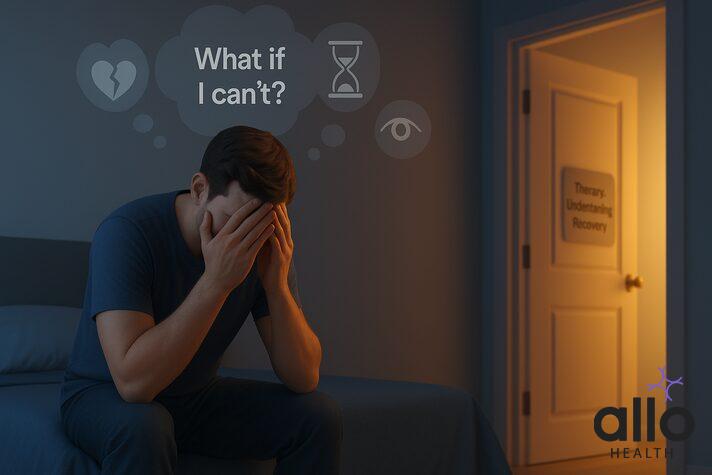
Understanding the root cause of your erectile dysfunction- whether physical or psychological is essential. Struggling to get an erection due to performance anxiety doesn’t just affect your sexual experience; it can also create tension in your relationship. Ignoring the issue won’t make it disappear. In fact, it often leads to a vicious cycle that can negatively impact your confidence and overall quality of life.
Don’t wait, talk to a doctor today to uncover the real cause and start your path to recovery.
"The following blog article provides general information and insights on various topics. However, it is important to note that the information presented is not intended as professional advice in any specific field or area. The content of this blog is for general educational and informational purposes only.
Book consultation
The content should not be interpreted as endorsement, recommendation, or guarantee of any product, service, or information mentioned. Readers are solely responsible for the decisions and actions they take based on the information provided in this blog. It is essential to exercise individual judgment, critical thinking, and personal responsibility when applying or implementing any information or suggestions discussed in the blog."






